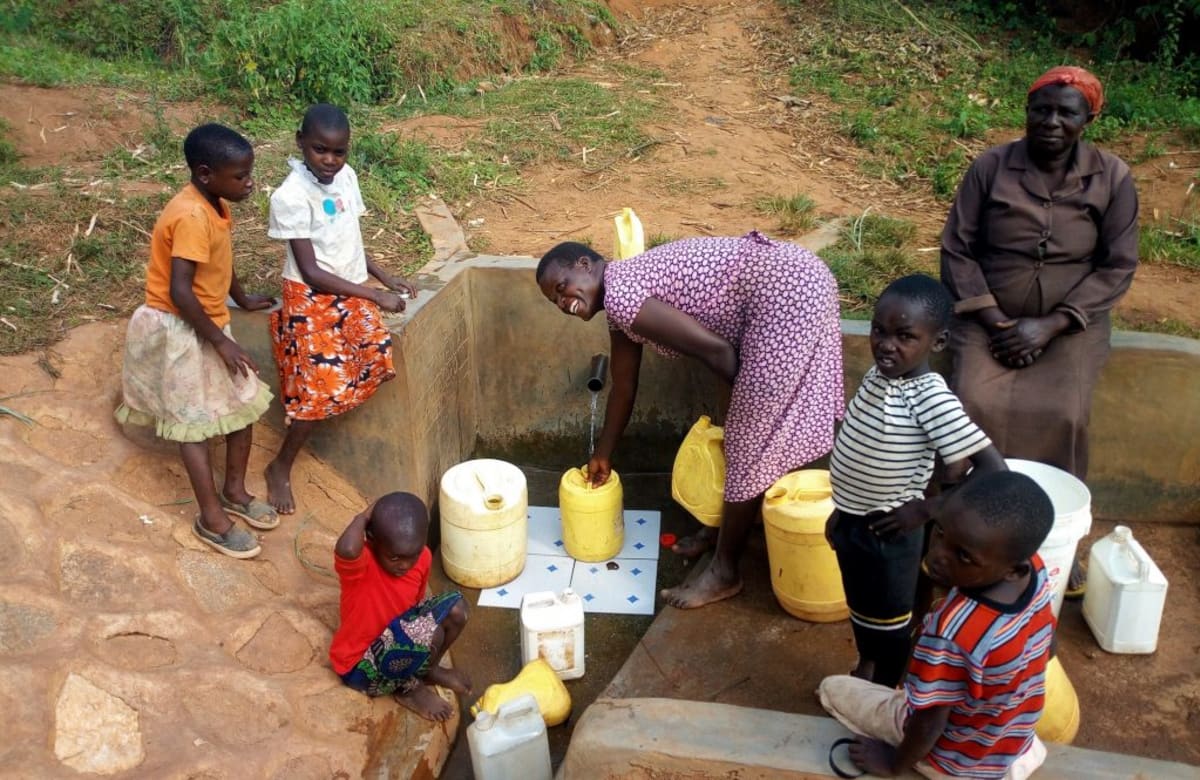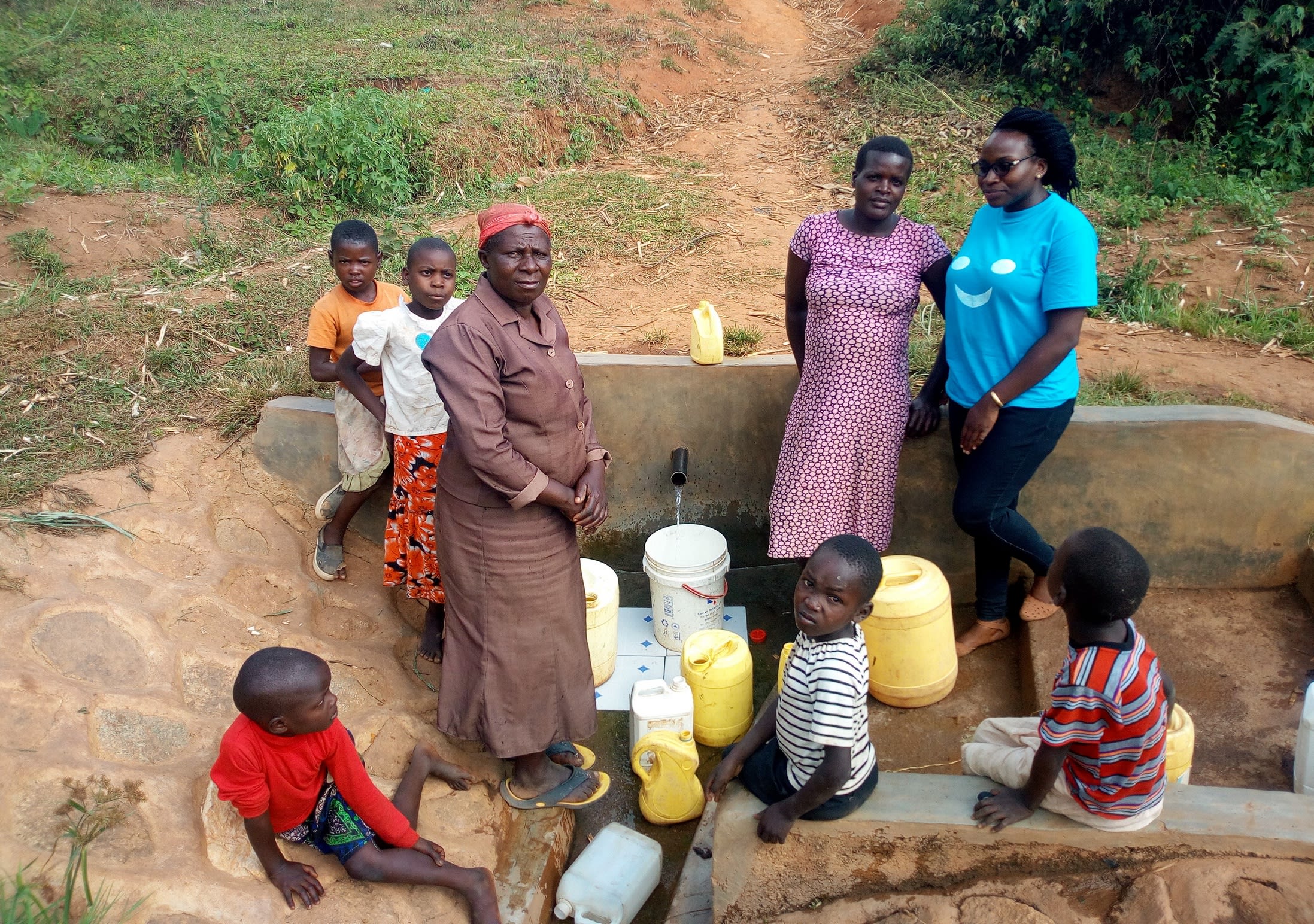The routine for people living in Futsi Fuvili Village is the same everyday, with people waking up as early as 5:30 AM. Men and women share most of the day's chores, which start with either of the two milking the cows and preparing breakfast for the children. Most children need to leave by 6:30 AM for school. Water is fetched to be used in various household chores. The compound is then cleaned, animals are taken out for grazing, and the rest of family members either head out to the farm, or downtown in search of casual work. Most of the people in this community generate their livelihood from farm products that they sell during market days.
Farmers here specialize in growing sugarcane to sell to the Butali Sugar Company. Other popular crops are maize, beans, bananas, and arrow root.
Water Situation
Futsi Fuvili Spring is the main water source in Futsi Fuvili. It is unprotected and open to contamination from animal and human activity as well as surface runoff during and after the rains, when waste is washed into the water. The water is mainly used for drinking, cooking, cleaning, bathing, watering animals, and irrigating plants.
20-liter jerrycans are brought to the spring, along with a smaller cup or jug that is used to bail water. When delivered back home, water is kept in these jerrycans until they need to be filled again. Some of the water is poured into clay pots that keep it cool enough for drinking.
Despite the long dry period that has affected the entire country, springs in this location have not dried. There's even enough water for locals to water their plants and thus provide food for their families. But after consuming this water, people suffer from waterborne diseases, especially the vulnerable young and old.
Sanitation Situation
The parents who have pit latrines are constantly in fear that they will collapse with them or their children inside. The conditions are pathetic, as most of them are mud-thatched and almost impossible to clean. A little over half of households in Futsi Fuvili have their own pit latrine, with the others either sharing with a neighbor or seeking the privacy of bushes. Miss Makero said, "The able community members managed to build up their own pit latrines, but which have no lasted, those who weren't able, relieve themselves in the bushes. This endangers our own lives, with children complaining of stomach upsets. We therefore hope some assistance will come soon."
There are few hand-washing stations, nor are there many helpful tools like dish racks or clotheslines. Garbage, whether compostable or not, is all thrown behind the house.
Plans: Hygiene and Sanitation Training
Community members will attend hygiene and sanitation training for at least two days. This training will ensure participants are no longer ignorant about healthy practices and their importance. The facilitator plans to use PHAST (Participatory Hygiene and Sanitation Transformation), CLTS (Community-Led Total Sanitation), ABCD (Asset-Based Community Development), group discussions, handouts, and demonstrations at the spring.
Training will also result in the formation of a committee that will oversee operations and maintenance at the spring. They will enforce proper behavior around the spring and delegate tasks that will help preserve the site, such as building a fence and digging proper drainage.
Plans: Sanitation Platforms
On the final day of training, participants will select five families that should benefit from new latrines.
Training will also inform the community and selected families on what they need to contribute to make this project a success. They must mobilize locally available materials, such as bricks, clean sand, hardcore, and ballast. The five families must prepare by sinking a pit for the sanitation platforms to be placed over. All community members must work together to make sure that accommodations and food are always provided for the work teams.
Plans: Spring Protection
Fetching water is predominantly a female role, done by both women and young girls. Protecting the spring and offering training and support will therefore help empower the female members of the community by giving them more time and efforts to engage and invest in income-generating activities.
In addition, protecting the spring will ensure that the water is safe, adequate and secure. Construction will keep surface runoff and other contaminants out of the water. This community is particularly needy, with a dirty water source and poor living standards; living below a dollar a day, they have no money to get medical care for treating the diseases that affect them. This spring protection will help them stay healthy and not need that medical care!

 Protected Spring
Protected Spring
 Rehabilitation Project
Rehabilitation Project





























